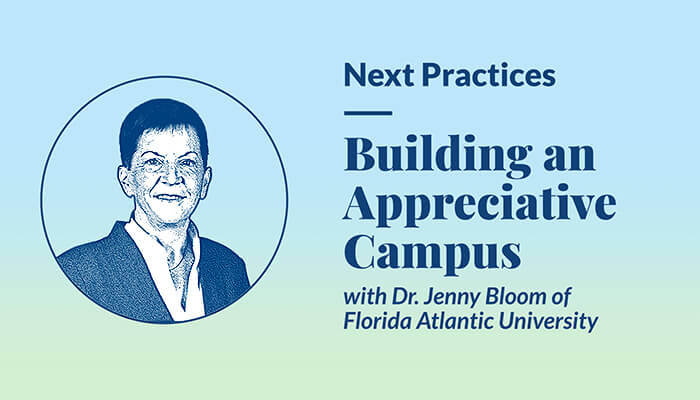
Building an Appreciative Campus with Dr. Jenny Bloom
Share this Post
Subscribe: Spotify | Apple Podcasts | Youtube Music | Full Transcript
As higher education leaders experience the widespread success of Appreciative Advising, many are seeking new ways to integrate Appreciative Education into their entire campus. The Office of Appreciative Education at Florida Atlantic University (FAU) is spearheading this effort by helping leaders apply the same principles used in Appreciative Inquiry and advising to every level of their institution from the top down.
In this episode of Next Practices, we hear from Dr. Jenny Bloom, tenured professor in the Department of Educational Leadership and Research Methodology, and the founder of the Office of Appreciative Education. We discuss the development of Appreciative Education, the potential institutions have to expand the principles of Appreciative Inquiry to all levels of leadership, and how an Appreciative Campus can transform students’ academic and career experiences.
Optimize interactions in all levels of leadership
Building an Appreciative Campus starts by optimizing interactions through the same methods advisors use with students. It’s through the trustworthy relationships and positive mindset of Appreciative Advising that we see the necessary framework for other campus initiatives. By applying the same principles of asset-based advising to other student success efforts, we shift our focus from challenges and setbacks towards skills and opportunities. This positive-first mindset improves student experiences and changes the way leaders collaborate, make decisions, and implement strategies. From advising, administration and leadership to teaching and learning, creating an Appreciative Campus begins with optimizing interactions at every level, and coming up with strategies based on what is working, rather than what isn’t.
Ask generative questions
Generative questions are an important facet of Appreciative Advising, and equally so in building an Appreciative Campus. Building relationships in every level of an institution comes by asking questions that naturally prompt storytelling and open-ended discussions. Not only do these conversations uncover relevant insights and opportunities, they build a culture of collaboration and positivity.
One practical approach to fostering constructive conversations through generative questions is replacing the deficit-based questions in a SWOT analysis (strengths, weaknesses, opportunities, threats), with asset-based questions in a SOAR analysis (strengths, opportunities, aspirations, results). This simple but significant shift encourages better buy-in from students and staff, reduces defensive conversations, and sets the stage for more collaborative discussions and solutions.
Use generative artificial intelligence to build an Appreciative Campus
The infusion of artificial intelligence into higher education has opened up new opportunities for institutions to build meaningful relationships with students, faculty, and staff. Higher education leaders can spend more time on the relational aspects of their work by delegating time-consuming tasks to generative artificial intelligence.
The key to using artificial intelligence to help build an Appreciative Campus is asking the right prompts. Dr. Bloom encourages institutions to input the particular issues they’re facing, and ask the AI software to generate a list of appreciative questions that will help spark meaningful conversations. Not all of the results will be perfect solutions, but they can provide enough of a framework to help leaders conceptualize ideas that will work for their unique situations.
For institutions looking to build an Appreciative Campus, Dr. Bloom recommends exploring the myriad of free resources available online, including those at FAU’s Office of Appreciative Education. To learn more about Dr. Bloom’s thought leadership in Appreciative Education, and practical implementation strategies, listen to our full conversation on Next Practices.



